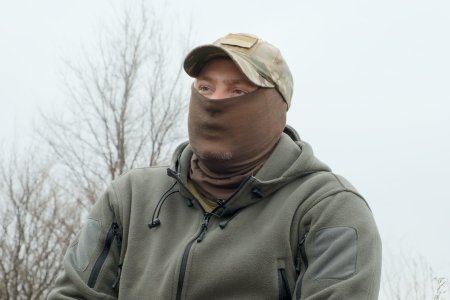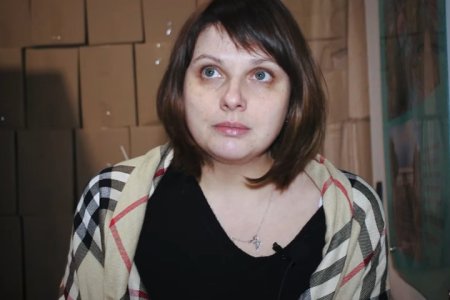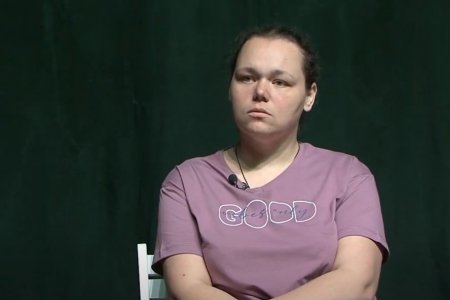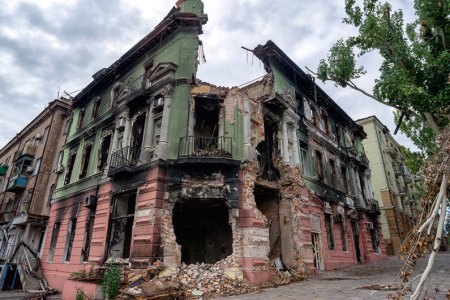
My name is Akhtyn Volodymyrovych Batko. I was born in Kherson and lived there. Until 2014 I had parents, I had everything. But in 2014, in one month, I had four losses: my wife, child, mother and grandmother died. I was left on my own. Before this situation [the war] I had lived in Kherson and had been working there.
What was the first day of the full-scale war in Kherson like?
On February 24 there was yet nothing in Kherson... Almost nobody knew anything. Only the TV broadcasted that two rockets had hit in Odesa... So everyone was quite calm.
But then it started... We had an airport in Chornobaivka. The battles started. And then they started shooting, and that’s when people realised it was really a war. Because before those events nobody wanted to believe that Russia attacked us.
Exactly when the battles started near Chornobaivka, all the people felt it, and me personally, that the war started. I lived in a private house. An elderly couple lived next door, I used to look after them. On the first day of the war, when this invasion began, the first thing I did was to run to them and warn them that they had to save food and, if possible, move to the cellar, that indeed the war had started. They did not believe it, she said to me: “Listen, son, what are you saying? How can it be possible?” But when the shootings started, only then they believed.
There were a few moments during the day when rockets started hit the buildings, we were bombed. But it was more or less calm. But from 9 pm onwards, when they [Russian troops] entered the city... they started looting, breaking into houses — that’s when people realised everything...
What was life for civilians under occupation like?
When Russian soldiers entered the city, they were dressed so pathetic, like homeless, for real. I mean, their shoes were taped over with scotch tape! They were wearing big overcoats! But they had guns — and all of them were drunk, well, really drunk — I can say totally drunk.
They came into the houses, pulled the bolt and said to people who lived there: “That’s it, we’re going to kill you, give us the gold!” They stole cars as well. I saw it with my own eyes.
They looted terribly. Old people were also mocked — an old woman who lived a couple of houses away from me said to them: “Sons, what are you doing?” And they answered: “How the f**k do you call us? Sons? We will kill you here right now and that’s it”. So, this is how it was...
On Demian Bidny Street 47A, there was a house, people lived there. And there were wrought iron gates there. So they [Russian troops] just removed the gate. And there was a garage, they took everything they saw out of the garage because the owner of the house had a jeep car there. And the man’s first question to them was: “Who are you?” They hit him with the gun’s stock, took him out, put him on his knees and said: “You are going to die here.” And they started taking TVs out of the house, some different tools of the garage and other stuff.
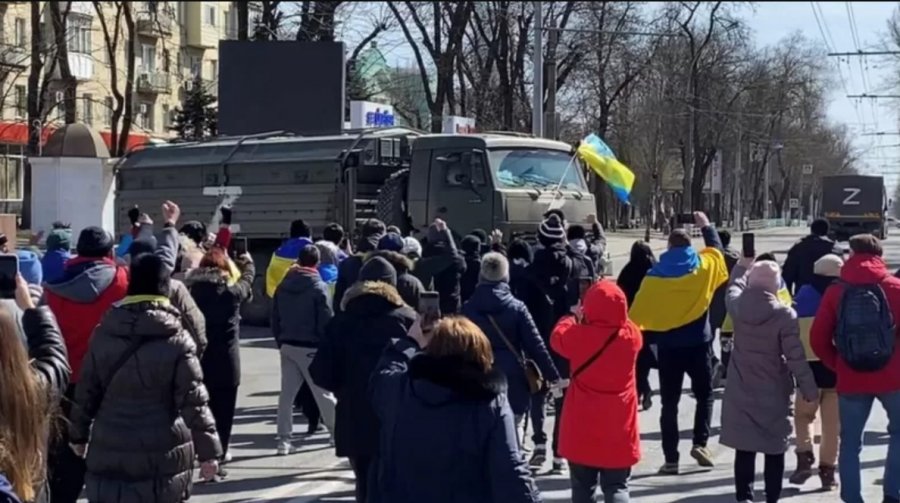
But most of all they were stealing clothes: sneakers, tracksuits, etc. They changed their clothes right there, because once again, their uniform was awful, their sleeves were so long. They were dirty, smelly, unshaven. And all of them were drunk.
During the second and third weeks of the occupation the shops were closed. There were people who got bread from somewhere. And tried to deliver it to people. So, Russian soldiers stopped the car with bread, threw the bread out and ran over it with their car. So that people would have nothing to eat.
They did the same with women... I did not personally see it with my own eyes, but women were raped.
Have you witnessed other criminal actions against civilians?
Well I had such a situation: I went out in the morning in order to eat somewhere, so I left the house. I came back — and there was no house because a rocket had hit it. It happened on March 18, my address was Ladychuk Street 22a, it was a private house. The house was old, I had got it from my parents. It was made of clay, but still it was good, it was my home. So I came and instead of my house there were only ruins...
Then I saw other situations. A car pulled up, the tinted glass went down. You know, almost everyone there [in Kherson] was Russian-speaking. And someone from the car asked: “Who are you for? For Ukraine or for Russia?”. Of course, most people said “for Ukraine”. “Ah you Banderas!” (Russians call pro-Ukrainian people “Banderas” because of the surname of a famous Ukrainian politician and activist Stepan Bandera) — and they took people from the streets and got them into the car! So they [Russian troops] opened the trunk and threw people in it. And they took them to an unknown destination. They were also beating people, it was scary to walk down streets. They burnt cars as well.
There was a military district, it was a sector with private houses. There are few not damaged houses left. Because the houses looked rich, they [Russian troops] could actually come into a house, sit in the middle of a room and defecate, sorry my language. That was hell what those Russians did there, really.
And there was one more situation. All shops and markets were closed. There was a bar in Kherson — “The Black Cat”. The owner of the bar made there free lunches for the elderly people. During the first day it was fine, but on the second day, when more people had gathered and they started giving out lunches, a jeep pulled up. Those Russians came out of the car — they smashed everything, shot into the air. They said: “Do you want to eat? F**ck you, you don´t get any food! Go to Banderas and ask them for food!"
What do your friends who stayed in Kherson tell?
Many of them are still there. They get in touch sometimes. They say: it was a horror. That is why people came to the city council, to the main square. Since all the shops were closed, people simply wanted to eat.
They took Ukrainian flags and went out there for the rally. So those Russians, they came to the square and started shooting into the crowd.
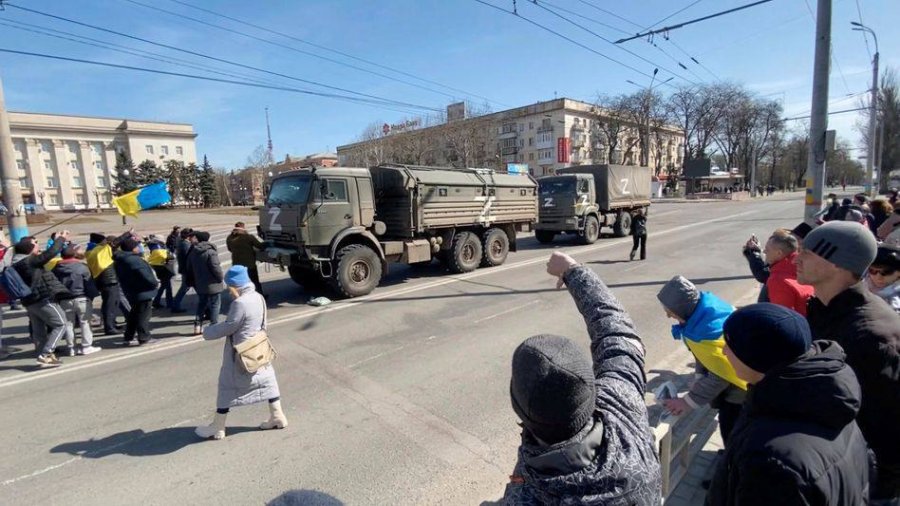
Even now, just two weeks ago, I called a friend, his name is Maksym. He has a wife and two children. He says it is terrible what is going on. For example, food: one loaf of bread costs 150 hryvnias (about 3,75 Euro)...
How did you manage to leave the occupied territories?
I had a neighbour... We barely found petrol. He worked at a vegetable warehouse as a driver... We have a vegetable warehouse on Perekopska Street. He somehow managed to get several of litres of petrol there. First we drove a day and a half to Mykolaiev, and then — from Mykolaiev to Odesa.
There were checkpoints and it’s terrible what they [Russian troops] did at the checkpoints: they searched cars, took people´s food, money, phones, everything. They took away everything.
Perhaps we passed it quickly because my neighbour had relatives in Russia. And he had a residence permit — they [Russian troops] were more or less tolerant to us. And after that I took an evacuation train and arrived to Odesa.
Translation: International Society for Human Rights (German Section)
 The article was prepared by the Kharkiv Human Rights Protection Group with the support of the "
The article was prepared by the Kharkiv Human Rights Protection Group with the support of the "